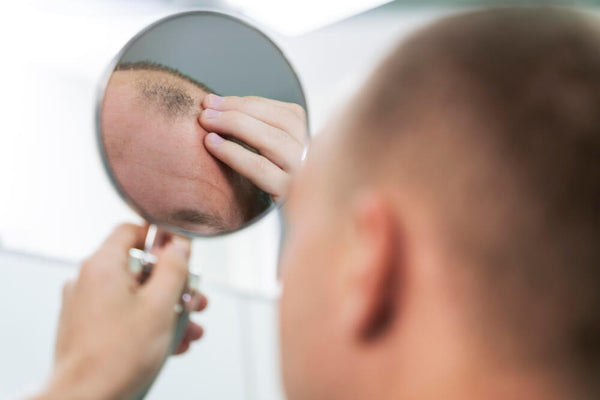That moment in the doctor's office stays with you. The quick glance at your scalp. The vague diagnosis. The prescription for the same topical treatment everyone else gets. You leave wondering, "Did they even really see me? Do they understand what's happening to my hair?"
If you've been through this with hair doctors in Atlanta, you're not alone. Most physicians receive shockingly little training on hair loss in melanated women. They might recognize classic female pattern baldness, but conditions like CCCA? Traction alopecia? The subtle signs that distinguish breakage from true hair loss? That requires specialized expertise.
So how do you find someone who actually gets it? Here's what I've learned from helping hundreds of women navigate this exact search.
What Actually Makes an Atlanta Hair Doctor "Good" for Black Women?
It's not just about medical degrees. It's about cultural competency and specific experience.
A truly effective hair doctor for our community needs to understand:
-
The unique architecture of our hair follicles and growth cycles.
-
How to spot the early signs of CCCA before scarring sets in.
-
The difference between traction alopecia and genetic thinning.
-
Why our hair respond differently to common treatments.
-
How to examine a scalp without causing further breakage.
I can't tell you how many women come to me after being told to "just use minoxidil" by doctors who didn't understand that the alcohol base would destroy their already fragile hair. That's the difference between a general prescription and actual understanding.
Why Does Cultural Competency Matter for Your Treatment Results?
This isn't about feelings—it's about medical accuracy.
When a doctor understands Black hair culture, they ask better questions. They'll ask about your styling habits—braids, weaves, wigs, heat use. They'll understand that "washing my hair every day" isn't practical or necessary for our hair texture. They won't recommend treatments that conflict with your cultural practices.
More importantly, they know what to look for. They can distinguish between the temporary shedding of telogen effluvium and the permanent follicle destruction of advanced CCCA. This isn't just knowledge you get from textbooks—it comes from hands-on experience with hundreds of patients who look like you.
What Questions Should You Ask During Your Consultation?
Don't just sit there nodding. This is your health, your hair, your money. Come prepared.
Ask them directly:
"What's your experience treating CCCA and traction alopecia?"
"Can you show me before/after photos of patients with my hair type and condition?"
"What diagnostic tools do you use beyond basic blood work?" (They should mention scalp biopsies, trichoscopy, and possibly hair mineral analysis)
"How do you approach hormonal hair loss in Black women specifically?"
"What's your philosophy on combining traditional medicine with functional approaches?"
Their answers will tell you everything. If they seem uncomfortable or vague, keep looking.
How is a Functional Medicine Approach Different?
Most hair doctors stop at diagnosing the type of hair loss. "You have alopecia areata." "You have female pattern hair loss." But they rarely answer the most important question: Why? Why you? Why now?
Functional medicine digs deeper. Instead of just saying "you have low iron," we ask why your iron is low. Is it diet? Absorption issues? An underlying inflammatory condition? We connect the dots between your gut health, your hormones, your nutrient levels, and what's happening on your scalp.
This is why we use comprehensive testing that looks at everything from your ferritin levels to your thyroid antibodies to your vitamin D. Your hair isn't separate from the rest of your body—it's a reflection of what's happening inside.
What Red Flags Should Make You Walk Away?
Trust your instincts. If you notice any of these, consider it a warning sign:
-
The doctor rushes you through the consultation and doesn’t really listen to you closely.
-
They push one specific treatment (usually the most expensive one) before doing proper diagnostics.
-
They can't show you results on patients with similar hair and concerns.
-
They dismiss your observations when you tell them about what makes your hair better or worse.
-
They don’t seem to be familiar with conditions common in Black women like CCCA.
You deserve someone who respects your intelligence and involves you in your treatment plan.
Why Do So Many Women Trust Nina Ross Hair Therapy?
I'll be direct with you—what makes our practice different isn't magic. It's a specific approach born from understanding what others miss.
We combine:
-
Medical-grade diagnostics to understand exactly what's happening.
-
Functional medicine principles to find your root causes.
-
Cultural competency that comes from specializing in textured hair.
-
Advanced treatments like PRP and exosome therapy.
-
Realistic expectations. We are always honest about what we can and can't fix.
But most importantly, we listen. We understand the emotional weight of hair loss you have to carry around. We know it's not vanity—it's identity.
Time To Get Your Best Hair Back: Book Your Appointment Now
Stop cycling through doctors who don't understand your hair. You deserve a specialist who sees you, hears you, and actually knows how to help. Book your $99 Hair Therapy Evaluation at Nina Ross Hair Therapy—Atlanta's trusted choice for women who want real answers and real results.
Let's finally get you on a path that actually works for your hair.














